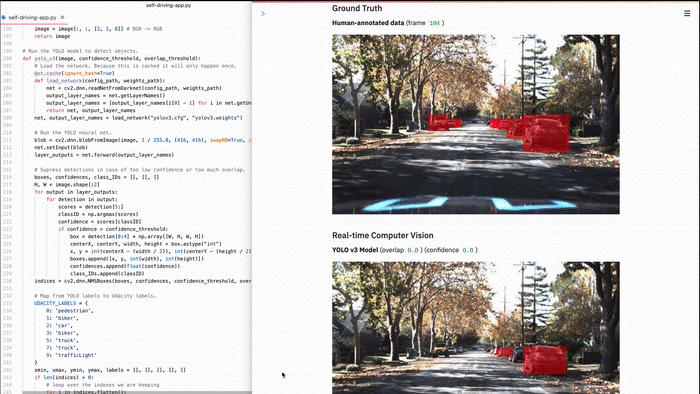python -m streamlit run 10890091_Stella_hw2.py
pip install streamlit
import pandas as pd
import streamlit as st
from sklearn import datasets
from sklearn.ensemble import RandomForestClassifier
from sklearn.metrics import accuracy_score
from sklearn.model_selection import train_test_split
from sklearn.tree import DecisionTreeClassifier
from sklearn.datasets import make_moons
import numpy as np
import math
from sklearn.svm import SVC
df = pd.read_csv("./winequality-white.csv", sep=';')
print(df.head(5))
print()
X = df.drop('quality', axis=1)
y = df['quality']
X_train, X_test, y_train, y_test = train_test_split(X, y, test_size=0.2, random_state=8)
Suppose we train 3 models
model_list = ['Decision Tree (DT)', 'Support Vector Machine (SVM)', 'RandomForest(RF)']
we can create a selection box inside the APP
classifiers = st.selectbox("Which machine learning classifier model is used?", model_list)
Now, let' trained the model selected by the user from the model list
if classifiers == 'Decision Tree (DT)':
# train the decision tree
dt = DecisionTreeClassifier()
# we train the model with fit() function
dt.fit(X_train, y_train)
# after training the model, we can evaluate the model performance with test dataset
# we can calculate the prediction accuracy
accuracy = dt.score(X_test, y_test)
# we can also show the evaluation results on the APP
st.write("Classification accuracy: ", accuracy)
# we can make prediction with trained model
pred_dt = dt.predict(X_test)
# then, we can calculate the confusion matrix with predicted values and real values
con_matrix_dt = accuracy_score(y_test, pred_dt)
# lastly, we can show the confusion matrix results on the APP
st.write("Confusion Matrix: ", con_matrix_dt)
print("The decision tree model is trained successfully!")
print()
elif classifiers == 'Support Vector Machine (SVM)':
# train the SVM
svc = SVC()
# we train the model with fit() function
svc.fit(X_train, y_train)
# after training the model, we can evaluate the model performance with test dataset
# we can calculate the prediction accuracy
accuracy = svc.score(X_test, y_test)
# we can also show the evaluation results on the APP
st.write("Classification accuracy: ", accuracy)
# we can make prediction with trained model
pred_svc = svc.predict(X_test)
# then, we can calculate the confusion matrix with predicted values and real values
con_matrix_svc = accuracy_score(y_test, pred_svc)
# lastly, we can show the confusion matrix results on the APP
st.write("Confusion Matrix: ", con_matrix_svc)
print("SVC is trained successfully!")
print()
else:
# train an ensemble bagging learner (RandomForest)
rf_model = RandomForestClassifier()
# we train the model with fit() function
rf_model.fit(X_train, y_train)
# after training the model, we can evaluate the model performance with test dataset
# we can calculate the prediction accuracy
accuracy = rf_model.score(X_test, y_test)
# we can also show the evaluation results on the APP
st.write("Classification accuracy: ", accuracy)
pred_rf_model = rf_model.predict(X_test)
con_matrix_rf = accuracy_score(y_test, pred_rf_model)
st.write("Confusion Matrix: ", con_matrix_rf)
print("The ensemble bagging learner - RandomForrest is trained successfully!")
print()
main panel
st.title("White wine machine learning prediction!")
side panel
st.sidebar.header("User Input Parameters.")
def user_input_features():
fixed_acidity = st.sidebar.slider("Fixed Acidity", 6.0, 9.0, 7.0)
volatile_acidity = st.sidebar.slider("Volatile Acidity", 0.2, 0.4, 0.27)
citric_acid = st.sidebar.slider("Citric Acid", 0.3, 0.5, 0.36)
residual_sugar = st.sidebar.slider("Residual Sugar", 0.1, 25.0, 20.7)
chlorides = st.sidebar.slider("Chlorides", 0.04, 0.06)
free_sulfur_dioxide = st.sidebar.slider("Free Sulfur Dioxide", 17, 200, 170)
total_sulfur_dioxide = st.sidebar.slider("Total Sulfur Dioxide", 0.1, 3.0, 1.001)
density = st.sidebar.slider("Density", 0.8, 2.0, 1.001)
pH = st.sidebar.slider("pH", 1.0, 7.0, 3.0)
sulphates = st.sidebar.slider("Sulphates", 0.3, 0.5, 0.45)
alcohol = st.sidebar.slider("Alcohol", 1, 10, 6)
# create a data dictionary
data = {
"fixed_acidity": float(fixed_acidity),
"volatile_acidity": float(volatile_acidity),
"citric_acid": float(citric_acid),
"residual_sugar": float(residual_sugar),
"chlorides": float(chlorides),
"free_sulfur_dioxide": float(free_sulfur_dioxide),
"total_sulfur_dioxide": float(total_sulfur_dioxide),
"density": float(density),
"pH": float(pH),
"sulphates": float(sulphates),
"alcohol": float(alcohol)
}
# create a dataframe with data stored in the dictionary
features_df = pd.DataFrame(data=data, index=[0])
return features_df
let's call the function and create the users' inputs
user_inputs = user_input_features()
show the inputs on the side panel
st.subheader("Users' Inputs")
st.write(user_inputs)




